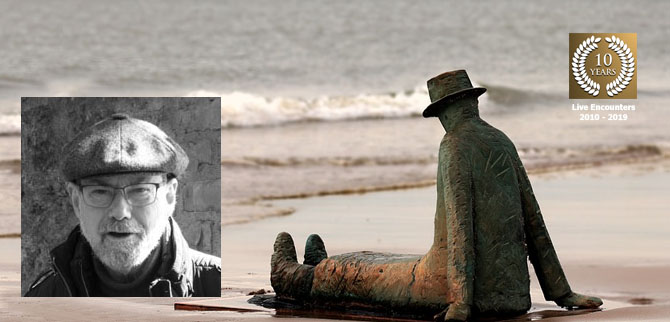Poems by Jack Grady
Jack Grady is a war veteran and a founder member of the Irish-based Ox Mountain Poets. His poetry has appeared in Live Encounters Poetry and Writing; Crannóg; The Galway Review; The Ekphrastic Review; Poet Lore; Skylight 47; Mediterranean Poetry; Dodging the Rain; The Worcester Review; North West Words; A New Ulster; Mauvaise Graine; Outburst Magazine; The Runt; Algebra of Owls; The Irish Literary Times; and in the anthologies And Agamemnon Dead: An Anthology of Twenty First Century Irish Poetry; A New Ulster’s Voices for Peace; Poetry Anthology Centenary Voices April 2016; 21 Poems, 21 Reasons for Choosing Jeremy Corbyn; A New Ulster’s Poetry Day Ireland Anthology 2017; Poesia a Sul 1; 300K: Une anthologie de poésie sur l’espèce humaine; and Magnum Opus: An Anthology on Universal Oneness. He read in Morocco at the 3rd annual Festival International Poésie Marrakech, as the poet invited by its committee to represent Ireland, and he read recently as the poet from Ireland at the 5th annual Poesia a Sul international poetry festival, in Olhão, Portugal. Two of his poems will be appearing in November in an issue featuring eighteen contemporary Irish poets in Pratik: A Magazine of Contemporary Writing. His poetry collection, Resurrection, was published by Lapwing Publications in October 2017 and was nominated for the T.S. Eliot Prize, and it can be ordered from their list of poets on the Lapwing Publications website or via their direct link to the collection, which is Jack Grady – Lapwing Store.
A Prophet Self-Censored
Every day, he feels like a sole survivor
whose platoon was caught in a crossfire,
who cowers under friends who are dead
while bayonets of the enemy probe to decide
if he ever had the guts to be alive.
With every fake revelation, every media-
show-trial interrogation, he shrinks into a corner
of silence and shame. He’s fed lies from airwaves
at breakfast and dinner and agrees they are truth absolute
so that scraps and bones will still roll onto his plate.
He avidly obeys every order for his mind to remain
distracted and dull, and, for secret intelligence
the reports he now reads are only scandal and sports.
Daily, he’s barraged by incessant harangues
devised to keep us divided,
prodded to embrace either CNN
or Let’s Make America Great Again,
the white robes of the KKK or the black masks of Antifa,
the dictates of the Empire’s client state in Brussels
or the Brexit delusion of a greater Great Britain.
Once, he had the vision of a Trojan Cassandra
and was honest and brave,
but he was branded a conspiracy theorist.
Others said they would silence him into shit
with brass-knuckles if he kept on like a peacenik.
Though he’s foreseen that a demon
the world twice witnessed
sprouting from a cloud over a city snuffed out
will soon lift with its fist the heads of us all
over sediment and schist in a world without breath,
he now chooses to be blinkered, mute and cowed,
afraid to be shunned or shouted down.
Anno Domini 2019
After Salvatore Quasimodo’s ‘Anno Domini MCMXLVII’
Will the time ever come
when the thundering of drums
in a dirge behind coffins will end
when we are done with the wrecking of cities
and with fists of iron
plunging from above
with the pummelling of lives
and with the splattering of blood
as on a toddler alone
terrified and crying
beside its dead mother
in a photograph snapped
in a train station bombed-out in China
or at a recent feast for a wedding
without photos in Yemen
where everything but bones
was annulled by drones?
Will the time ever come
when I am able to stop shouting
‘Why, my God, have you forsaken us?’
Will a taste for milk and honey
ever replace the vengeful detritus
of hatred and death
that hungers in our breasts?
Will we ever be allowed
to bury forever
our missiles under meadows
of sunflowers?
An Eye in the Storm
It’s not the man suspended by rope tied to his ankles
over the rubble of a blown-up butcher shop,
but the swarm of flies feasting on the raw meat
of his genitals.
And it’s not the bloody entrails exposed, yet still intact,
or the flaps of flesh ripped back from the open belly,
but the charred arms without hands
and still trying to grasp.
And it’s not the shock of seeing the body kicked
or the head swinging like the pendulum bob of a longcase clock
to tick away some time before the next attack,
but its one remaining eye
watching us
watch it.
The Stroke
When I heard the news,
I saw myself again at six years old
behind the bow of a rowing boat
and watching my parents
become smaller than toys
as strokes of the oars
took me further from them
on Lake Lashaway’s shore,
while my uncle, as he rowed,
replayed in his mind a single-sculls’ heat,
as he strove to repeat his championship win
with strokes approaching ram speed.
I turned to watch his back extend
from his taut waist with a new stroke,
then expand as it rose
into the twin mountains of his shoulders,
and it reminded me of the broad V
splashed over the black-and-white screen
of the TV on Saturday mornings
in the opening scene of Victory at Sea.
He was my hero. Unbeatable
like I believed the U.S. Navy to be,
and he was a famous swimmer, too,
for I knew of the medals he had won
when he outswam all comers
at the World’s Fair in 1939,
before the war he and my father
would win had dared to begin.
I don’t know why they call those things strokes –
what finally did him in –
but, when it came to rowing and swimming,
no stroke was too much for him.
© Jack Grady


